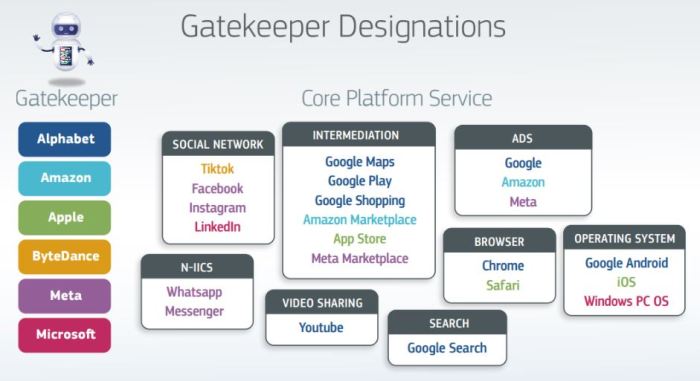
Apple EU Digital Markets Act Changes: Whats Next for the App Store?
Apple EU Digital Markets Act changes are shaking up the tech world, specifically impacting the App Store. This new legislation, aimed at fostering competition and user choice, is forcing Apple to adapt its business model, potentially leading to significant changes in how we interact with our iPhones and iPads.
The Digital Markets Act (DMA) is a groundbreaking set of regulations that targets large online platforms like Apple, Google, and Amazon. It seeks to address concerns about market dominance and anti-competitive practices by these tech giants. The DMA tackles issues like app store exclusivity, data access, and interoperability, aiming to create a more open and competitive digital landscape.
Overview of the EU Digital Markets Act (DMA)
The EU Digital Markets Act (DMA) is a landmark piece of legislation designed to address the growing dominance of large online platforms and promote fair competition in the digital market. It aims to create a more level playing field for businesses and consumers by regulating the practices of gatekeeper platforms.The DMA identifies and designates large online platforms as “gatekeepers” based on their market share, user base, and revenue.
These gatekeepers are subject to a range of obligations and prohibitions designed to ensure fair competition and protect consumer interests.
Key Objectives of the DMA, Apple eu digital markets act changes
The DMA seeks to achieve several key objectives, including:
- Promote fair competitionby preventing gatekeepers from abusing their market power to disadvantage smaller competitors and stifle innovation.
- Protect consumer interestsby ensuring that consumers have access to a wider range of choices, better prices, and greater transparency in the digital market.
- Foster innovationby creating a more level playing field for new entrants and promoting competition in the digital ecosystem.
- Enhance consumer rightsby giving users more control over their data and how it is used by online platforms.
Main Provisions of the DMA
The DMA includes a number of key provisions that apply to gatekeeper platforms:
- Interoperability: Gatekeepers must allow their services to interoperate with other platforms and services, enabling users to switch between platforms more easily.
- Non-discrimination: Gatekeepers cannot discriminate against businesses or consumers on their platforms based on their size, location, or other factors.
- Transparency: Gatekeepers must provide users with clear and transparent information about their data collection practices, algorithmic decision-making, and other platform policies.
- Access to data: Gatekeepers must provide businesses with access to their data, enabling them to develop and offer competitive products and services.
- Prohibition of self-preferencing: Gatekeepers cannot favor their own products or services over those of their competitors on their platforms.
Potential Impact of the DMA on Competition and Innovation
The DMA has the potential to significantly impact competition and innovation in the digital market.
- Increased competition: By preventing gatekeepers from abusing their market power, the DMA could lead to increased competition and a wider range of choices for consumers.
- Enhanced innovation: The DMA’s provisions on interoperability and access to data could foster innovation by enabling smaller businesses to develop and offer new products and services that compete with those of gatekeepers.
- Empowered consumers: The DMA’s focus on consumer rights and transparency could empower consumers to make more informed choices about the online services they use.
- Challenges for gatekeepers: The DMA’s obligations and prohibitions could pose significant challenges for gatekeepers, requiring them to adapt their business models and practices.
Apple’s Business Model and its Compliance with the DMA

The EU Digital Markets Act (DMA) aims to regulate large online platforms, including Apple, to ensure fair competition and protect consumers. Apple’s business model, characterized by its control over hardware, software, and app distribution, is under scrutiny for potential conflicts with the DMA’s provisions.
This analysis examines Apple’s core business practices and revenue streams, assesses their alignment with the DMA, and identifies areas where adjustments might be necessary for compliance.
Apple’s Business Model and Revenue Streams
Apple’s business model revolves around a vertically integrated ecosystem. The company designs, manufactures, and distributes hardware products, including iPhones, Macs, iPads, and Apple Watches. It also develops and distributes its own operating systems (iOS, macOS, iPadOS, watchOS) and software applications, including Safari, iMessage, and Apple Music.
Additionally, Apple generates revenue through its App Store, where developers can distribute their apps and pay a commission to Apple.
- Hardware Sales:iPhones account for a significant portion of Apple’s revenue, with strong demand for its premium devices and features. Macs, iPads, and Apple Watches also contribute to hardware sales.
- Software Sales:Apple generates revenue from software sales, including macOS, iOS, iPadOS, and watchOS. The company also sells productivity and creative software applications, such as Pages, Numbers, Keynote, and Final Cut Pro.
- App Store Revenue:Apple’s App Store is a major revenue source, generating commissions from app developers for in-app purchases, subscriptions, and app downloads. Apple charges a 15% commission on most app sales, with a 30% commission for certain services, such as in-app purchases.
The Apple EU Digital Markets Act changes are certainly making waves, forcing them to open up their ecosystem in ways they haven’t before. It’s interesting to think about how these changes might impact the way we use our devices, kind of like how settling into a new home in Phoenix, Arizona, like the one described in at home with new darlings in phoenix arizona , can shift your daily routine.
The digital markets act could be a similar kind of adjustment, forcing us to adapt to a new way of interacting with our tech.
- Services:Apple offers a range of services, including Apple Music, Apple TV+, iCloud storage, Apple Pay, and AppleCare+. These services generate recurring revenue and complement Apple’s hardware and software offerings.
Apple’s Compliance with the DMA
The DMA seeks to address concerns about gatekeeper platforms, including Apple, by imposing obligations aimed at fostering competition and protecting consumers. The following sections explore Apple’s compliance with specific provisions of the DMA:
Interoperability
The DMA requires gatekeeper platforms to allow users to install and use third-party apps on their devices without restrictions. Apple’s current practices, which limit app installation to its App Store, might be in conflict with this requirement.
- Sideloading:Apple currently restricts sideloading, which is the ability to install apps from sources other than the App Store. The DMA could require Apple to allow sideloading, potentially leading to a more open ecosystem and increased competition.
- App Store Monopolization:Apple’s App Store enjoys a dominant position in the iOS ecosystem. The DMA might require Apple to allow alternative app stores, potentially challenging its current control over app distribution.
Non-Discriminatory Treatment
The DMA mandates that gatekeepers cannot discriminate against third-party apps or services on their platforms. Apple’s practices regarding its App Store and the treatment of third-party payment systems have drawn criticism.
- Payment System Restrictions:Apple’s App Store currently requires developers to use its in-app purchase system, which attracts a 15% or 30% commission. The DMA might require Apple to allow developers to use alternative payment systems, reducing its revenue from app transactions.
- App Store Policies:Apple has been accused of using its App Store policies to disadvantage competitors. The DMA could require Apple to adopt transparent and non-discriminatory app review processes.
Data Access and Sharing
The DMA requires gatekeepers to provide users with access to their data and to allow data sharing with other services. Apple’s current practices, which restrict data access and sharing, might need to be adjusted.
- Data Portability:The DMA could require Apple to allow users to easily transfer their data to other platforms. This might necessitate changes to Apple’s data storage and sharing practices.
- Interoperability with Third-Party Services:The DMA might require Apple to enable interoperability between its services and those of third-party providers. This could impact Apple’s data access and sharing policies.
Transparency and Accountability
The DMA mandates transparency in the algorithms and processes used by gatekeeper platforms. Apple’s current practices regarding its algorithms and decision-making processes might require adjustments.
- Algorithm Transparency:The DMA could require Apple to provide more transparency into the algorithms used in its App Store and other services. This might involve disclosing how these algorithms prioritize apps, determine search results, and make recommendations.
- Decision-Making Processes:The DMA might require Apple to explain its decision-making processes regarding app review, content moderation, and other actions taken on its platforms. This could involve disclosing the criteria used for these decisions and providing mechanisms for appeal.
Specific Changes Required by the DMA for Apple

The EU Digital Markets Act (DMA) aims to create a fairer and more competitive digital market by regulating the practices of large online platforms. Apple, as a gatekeeper under the DMA, faces specific requirements that will significantly impact its business model and ecosystem.
This section explores the key changes that the DMA mandates for Apple, focusing on interoperability, sideloading, alternative app stores, and data access and portability.
Interoperability
The DMA requires large platforms to offer interoperability between their services and those of competitors. This provision is crucial for Apple, as it currently restricts users from accessing third-party messaging apps, making it difficult for users to switch between platforms.
The DMA mandates Apple to allow users to choose their default messaging app, enabling seamless communication across different platforms. This change could lead to increased competition in the messaging app market, potentially benefiting users by offering more choice and features.
For example, users might choose to use WhatsApp or Telegram as their default messaging app instead of iMessage, leading to a more diverse and competitive messaging landscape.
Sideloading and Alternative App Stores
The DMA compels Apple to allow users to sideload apps, meaning they can install apps from sources other than the App Store. This will give users more control over their devices and provide an alternative to the App Store’s restrictive policies.
Furthermore, the DMA requires Apple to allow alternative app stores to operate on its devices. This will increase competition in the app store market, offering users more choices and potentially leading to lower prices and more flexible app distribution models.
For instance, users might choose to download apps from alternative app stores that offer more affordable pricing or less stringent content moderation policies.
Data Access and Portability
The DMA’s regulations on data access and portability impact Apple’s data collection and usage practices. Apple will be required to provide users with more control over their data, including the ability to access and transfer their data to other platforms.
This means users can easily move their data from Apple’s services to competitors, such as Google or Microsoft. This requirement could limit Apple’s ability to leverage user data for targeted advertising and personalization, potentially impacting its revenue streams. Moreover, Apple will need to be more transparent about its data collection practices and provide users with clear and concise information about how their data is used.
This increased transparency could lead to users becoming more aware of their data privacy rights and potentially reducing their reliance on Apple’s services.
The EU’s Digital Markets Act is shaking things up for tech giants like Apple, forcing them to loosen their grip on their ecosystems. It’s a big deal for consumers, but it’s also a big deal for organizations like the Plastic Surgery Foundation , which relies on technology to connect with its members and supporters.
As the Foundation appoints its new president, Dr. Alan Matarasso, it’s likely they’ll be considering how to adapt to these changing digital landscapes, just like Apple and other tech companies.
Apple’s Response to the DMA
Apple has expressed concerns about the DMA, arguing that certain provisions could harm innovation and consumer choice. The company has engaged in public statements, lobbying efforts, and proposed adjustments to its practices to comply with the law.
Apple’s Public Statements and Actions
Apple has publicly stated its commitment to complying with the DMA while raising concerns about its potential impact. The company has argued that the DMA’s provisions could hinder innovation and consumer choice. Apple has also engaged in lobbying efforts to influence the final text of the legislation.
The EU’s Digital Markets Act is shaking things up for tech giants like Apple, forcing them to open up their ecosystems and give users more control. This includes potential changes to app distribution, payment systems, and even the way data is handled.
But what does this mean for developers? Well, it could lead to a surge in interest for tools that simplify development, like what are low code databases , which can help developers quickly build and deploy applications without needing to write complex code.
This could be a game-changer for developers looking to take advantage of the new opportunities presented by the EU’s Digital Markets Act.
Apple’s Arguments Against Specific Provisions
Apple has specifically objected to provisions that:
- Require app stores to allow sideloading of apps: Apple argues that sideloading could compromise user security and privacy by allowing the installation of malicious software.
- Prohibit app stores from favoring their own apps: Apple argues that this provision could prevent it from promoting its own apps and services, which it believes are in the best interests of users.
- Mandate interoperability between messaging services: Apple argues that interoperability could compromise the security and privacy of its iMessage platform.
Proposed Changes to Comply with the DMA
Apple has proposed a number of changes to its practices to comply with the DMA. These include:
- Allowing users to choose a default web browser and email client on iOS devices.
- Offering a new option for developers to distribute their apps outside of the App Store.
- Providing more transparency about its app store policies.
Potential Consequences of the DMA for Apple: Apple Eu Digital Markets Act Changes

The EU Digital Markets Act (DMA) is poised to have significant implications for Apple, potentially altering its financial landscape, operational strategies, and user experience. The act’s regulations could force Apple to make substantial changes to its business model, which could have a ripple effect across its entire ecosystem.
Financial and Operational Implications
The DMA’s regulations could impact Apple’s financial performance in several ways. The requirement to allow alternative app stores and payment systems could lead to a decrease in Apple’s revenue from app sales and in-app purchases. This could be particularly impactful for Apple’s App Store, which currently generates a significant portion of the company’s revenue.
Moreover, the DMA’s interoperability requirements could increase Apple’s operational costs, as it may need to invest in new technologies and infrastructure to comply with the act’s mandates.
Impact on User Experience and Market Share
The DMA’s regulations could also affect Apple’s user experience and market share. The ability for users to sideload apps could potentially lead to a decline in the quality and security of apps available on iOS devices, as Apple’s strict app review process would no longer be in place for all apps.
This could negatively impact the user experience and potentially damage Apple’s reputation for providing a secure and reliable platform. Furthermore, the increased competition from alternative app stores could erode Apple’s market share in the mobile operating system market.
Impact on Future Product Development and Innovation
The DMA’s regulations could also influence Apple’s future product development and innovation. The requirement to allow alternative payment systems could discourage Apple from investing in its own payment infrastructure and services. This could hinder the development of innovative features and functionalities within Apple’s payment ecosystem.
Additionally, the DMA’s interoperability requirements could potentially limit Apple’s ability to integrate its products and services seamlessly, potentially hindering the development of new and innovative products.
The Broader Impact of the DMA on the Tech Industry
The EU’s Digital Markets Act (DMA) is a landmark piece of legislation that aims to regulate the behavior of large online platforms and ensure a more competitive and fair digital marketplace. Its impact extends far beyond Apple, potentially reshaping the global tech landscape and influencing how digital businesses operate worldwide.
Comparison with Regulations in Other Jurisdictions
The DMA’s regulations are notable for their specificity and their focus on platform behavior. Compared to similar regulations in other jurisdictions, the DMA stands out in several key aspects:
- Specificity of Regulations:The DMA goes beyond general principles of competition and Artikels specific obligations for gatekeeper platforms, including interoperability requirements, restrictions on self-preferencing, and limitations on data collection. In contrast, regulations in the United States and other countries often rely on more general antitrust principles, leaving more room for interpretation.
- Focus on Platform Behavior:Unlike some antitrust laws that focus on market share and market dominance, the DMA specifically targets the behavior of large online platforms, aiming to address concerns about their potential to stifle competition and harm consumers. This targeted approach is unique and reflects the growing awareness of the power and influence of these platforms.
- Enforcement Mechanisms:The DMA includes robust enforcement mechanisms, with the European Commission having the power to impose hefty fines and order behavioral changes for non-compliant platforms. This strong enforcement mechanism aims to ensure compliance and deter future violations.
Potential Impact on the Global Tech Landscape
The DMA’s impact on the global tech landscape is likely to be significant, with potential ripple effects on businesses operating in various regions:
- Increased Competition:By promoting interoperability and reducing self-preferencing, the DMA could lead to increased competition in the digital marketplace, potentially benefiting smaller players and giving consumers more choices.
- Global Adoption of Similar Regulations:The DMA could serve as a model for similar regulations in other jurisdictions. As concerns about platform dominance grow worldwide, other countries may adopt similar rules to ensure a fair and competitive digital environment.
- Changes in Business Models:The DMA’s regulations could force large tech companies to adapt their business models, potentially leading to changes in how they monetize their services and interact with users.
Potential Long-Term Consequences for the Digital Economy
The DMA’s long-term consequences for the digital economy are complex and multifaceted. It could potentially lead to:
- Innovation and Growth:By promoting competition and reducing market dominance, the DMA could create a more dynamic and innovative digital economy, fostering the emergence of new businesses and technologies.
- Consumer Benefits:Increased competition could lead to lower prices, better services, and more choice for consumers. The DMA’s focus on data privacy and security could also enhance consumer protection.
- Challenges for Platform Companies:The DMA’s regulations could pose significant challenges for platform companies, requiring them to adapt their business practices and potentially reducing their profitability.







